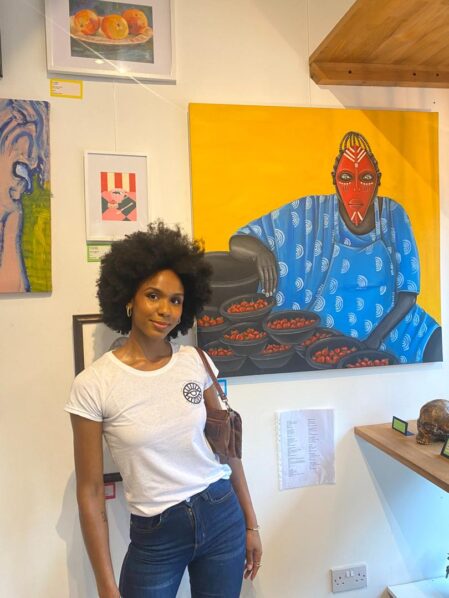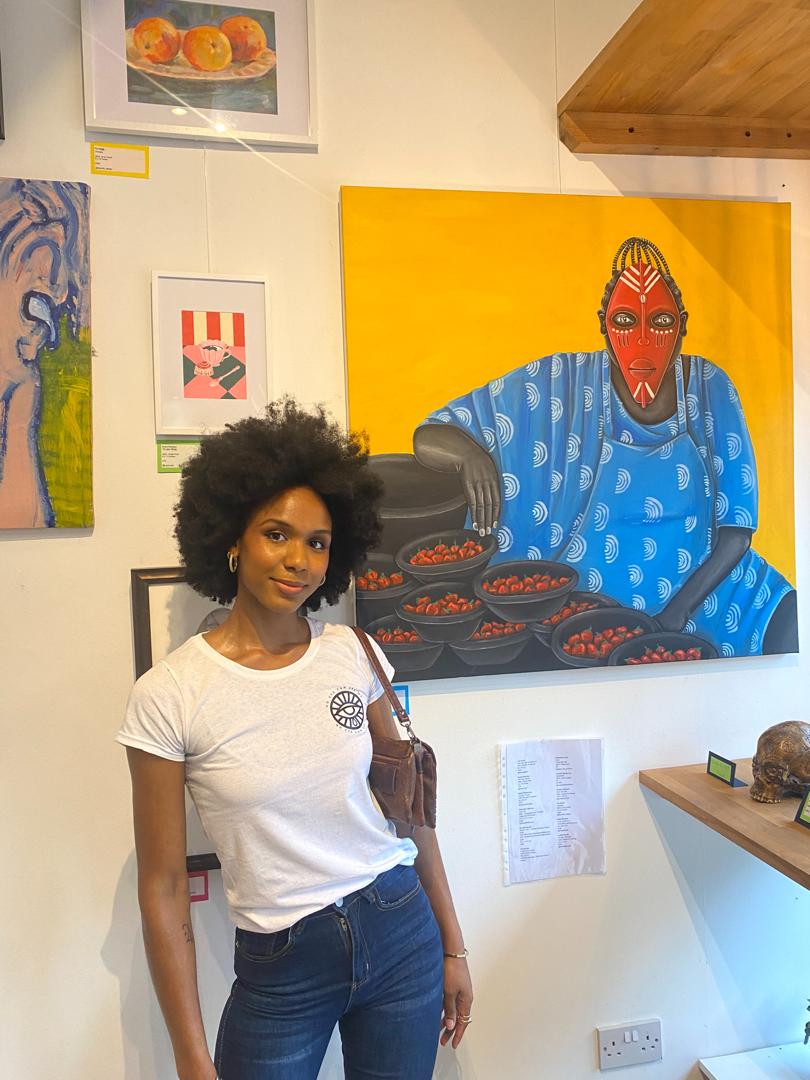
In the bustling art scene of London, Lebanese-Nigerian painter and photographer Sinatra Zantout has emerged as a powerful voice, using her work to highlight the stories of marginalized women, particularly those from low-income areas in Nigeria. Through her distinct style, which she has coined “Masqueradism,” Zantout uses African masks to explore complex themes of identity, resilience, and the often-overlooked strength of women navigating hardship in these communities.
Zantout’s dual heritage—growing up between Lebanon and Nigeria—profoundly influences her artistic practice. Drawing from the cultural richness of both countries, her work serves as a visual testament to the resilience of women, particularly women of color in disadvantaged societies. Through her intricate paintings and evocative photography, Zantout brings attention to the hidden struggles of these women, while simultaneously celebrating their perseverance and strength.
A Focus on Nigerian Women
Zantout’s series, “NO EYE CAN SEE ME,” brings to light the stories of women in Nigeria who, despite facing financial difficulties, continue to hold their communities together. These women are often mothers, caretakers, and breadwinners, working tirelessly to ensure the survival and success of their families. They are frequently caught in the intersection of economic hardship and societal expectations, yet their stories remain untold in mainstream narratives.
Through her art, Zantout provides these women with a platform, giving them visibility in a world that too often overlooks their contributions. Her work captures the dignity of these women, even in the face of adversity. By using African masks as a central motif, she explores the concept of identity—how these women must constantly wear metaphorical “masks” to navigate their roles in society. The masks serve as symbols of both protection and strength, representing how these women maintain their sense of self and community while contending with systemic challenges.
Challenging Stereotypes Through Masqueradism
Zantout’s “Masqueradism” is a distinctive artistic style that draws from the traditional African masquerade. In African cultures, masks are often used in rituals and performances to communicate with the spiritual world, represent ancestors, or embody specific societal roles. Zantout adapts this cultural symbol to challenge modern stereotypes, particularly around race, gender, and class.
In her paintings, the masks she uses are not meant to conceal but to reveal the inner strength, resilience, and multifaceted identities of Nigerian women. Zantout shows that these women are not simply victims of their circumstances; they are warriors, mothers, and leaders who endure, despite the immense challenges they face. Her use of vibrant colors and bold compositions further emphasizes their vitality and power, inviting viewers to engage with their stories on a deeper level.
A Voice for the Unheard
Zantout’s work goes beyond simply representing these women; it advocates for them. Through her art, she brings attention to the systemic inequalities that shape their lives, from limited economic opportunities to societal expectations around gender roles. Yet, despite these challenges, her work refuses to depict these women as helpless. Instead, Zantout focuses on their strength, their ability to endure, and their constant pursuit of a better future.
One of Zantout’s most notable achievements is her ability to convey emotion and narrative through the powerful combination of painting and photography. The women in her portraits, though often anonymous, radiate a quiet power. Whether through the depth of their gaze or the symbolism embedded in the masks, Zantout’s subjects challenge the viewer to look beyond surface-level assumptions and understand the complexity of their lives.
Recognition and Impact
Zantout’s artistic vision and dedication to telling the stories of marginalized women have not gone unnoticed. In 2024, she was shortlisted for the prestigious Dubel Prize in London, an honor that recognizes exceptional contemporary artists who address pressing social issues through their work. Her nomination for the 2024/2025 cycle of the prize underscores the powerful impact her art is having on the international stage, solidifying her reputation as a rising star in the global art community.
Her ability to intertwine personal, cultural, and political themes has earned her recognition in exhibitions across London, Lagos, and beyond. Whether displayed in prestigious galleries or commissioned as public art, Zantout’s work resonates with diverse audiences, drawing attention to the universality of her themes.
The Future of Zantout’s Work
As Sinatra Zantout continues to evolve as an artist, her commitment to telling the stories of underrepresented women remains at the heart of her work. Her art is not just about Nigerian women in low-income areas; it is about women everywhere who face adversity and continue to fight for their futures. Through “Masqueradism,” Zantout captures the essence of their resilience and reminds us of the strength that lies in unseen, everyday acts of survival.
In a world that often silences the voices of marginalized communities, Zantout’s art stands as a powerful reminder of the importance of visibility, representation, and dignity. Her work challenges us to see beyond stereotypes, to understand the complexities of identity, and to honor the strength of women who, despite the odds, continue to endure.
Sinatra Zantout is not only an artist but a storyteller, using her canvases and lenses to amplify the voices of women who might otherwise go unheard. Through her art, these women are seen, recognized, and celebrated.






